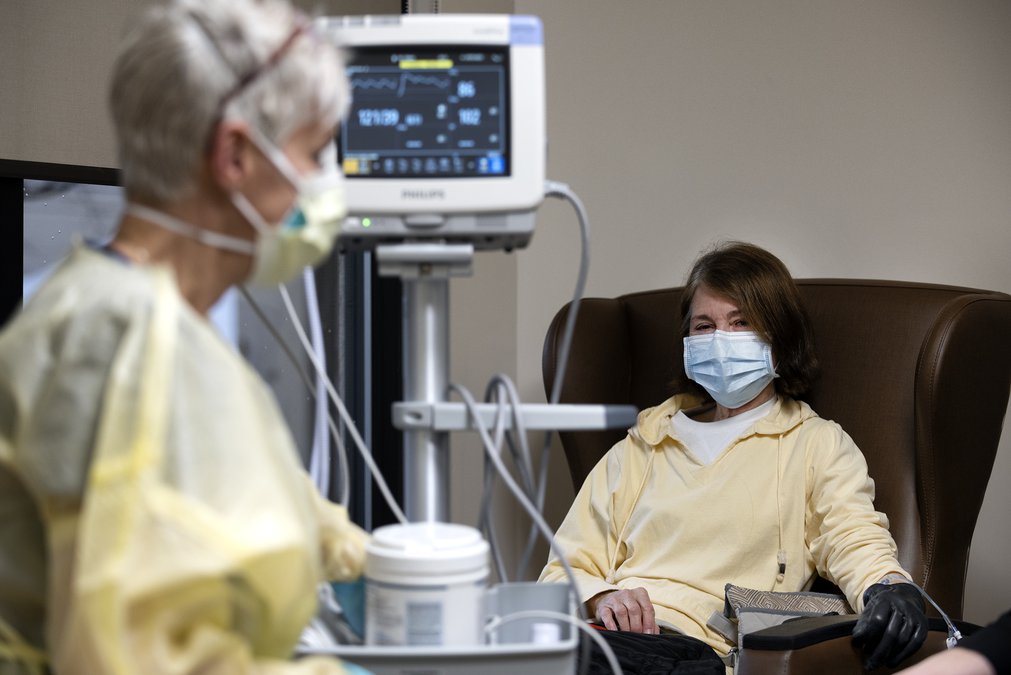The Northeast Georgia Health System is sponsoring coverage directly related to public safety so that it can be made available free to non-subscribers as a public service. News coverage is independently reported. We know that you need accurate and up-to-date information about the effects of the coronavirus in the state and our region. Please consider supporting our work by subscribing to The Times.
Health systems may be overwhelmed with the latest surge of COVID-19, but they have also learned more about how to fight it.
Monoclonal antibodies treatments have been highly effective at preventing hospitalization or serious illness for patients who start treatment within a week of experiencing COVID-19 symptoms, said Dr. Supriya Mannepalli, director of infectious disease medicine for Northeast Georgia Health System. The antibodies help prevent the virus from attaching to the body’s cells, she said, regardless of whether a person is vaccinated or not.
“The monoclonal antibodies treatment is nothing but laboratory manufactured antibodies,” Mannepalli said. “Our body is trying to tell our antibodies to attack the virus. By injecting these antibodies, what we’re doing is giving our bodies the ability to fight the infection.”
The health system has been administering this treatment since last fall, but it has ramped up in the last couple months as the delta variant has caused a higher volume of COVID-19 positive patients to come to the hospital. The health system had 302 COVID-19 positive patients on Wednesday, Sept. 1, and all patients in critical care were unvaccinated. And with delta, Manneppalli said, many patients are getting sicker more quickly.
The monoclonal treatment through IV infusion was given emergency FDA approval last November, and several monoclonal antibody treatments have been approved since. Mannepalli said they have started administering subcutaneous treatments recently rather than IV infusions. This means they can give patients the monoclonal antibodies in the form injections under the skin, which takes less time than infusion through an IV directly into a vein.
Supriya recommended those who test positive for COVID-19 talk with their doctor to see if the monoclonal antibodies treatment would be right for them. Primarily, it is used for people with other health conditions that make them more likely to get seriously ill from COVID-19 without other treatment, and it is for those who have a mild to moderate case, not patients who are already hospitalized. The treatment is most effective when given within seven days of becoming symptomatic.


All Northeast Georgia Physician Group ambulatory sites offer the treatment, Mannepalli said, as well as the health system’s emergency departments. Recently, several primary care physician offices have started to offer the treatment as well, she said.
The health system has been stressed lately trying to find more space for an influx of patients, and those patients are often sicker. The health system’s ventilator use is up to 72% as of Wednesday, Sept. 1, higher than any point during the pandemic since it started to collect these data.
Once patients are in the hospital, Mannepalli said, steroids are still the most effective treatment.
“We continue to update, but once the patient comes into the hospital the only one that’s been proven to really help is steroids,” she said.
Those who want to help their immune system while at home sick with the virus should consult their primary care physician on what would be best for them. Mannepalli said some treatment options include vitamins C and D, melatonin and zinc.
Though the health system’s data show as of Wednesday, Sept. 1, that about 16% of COVID-19 positive patients are vaccinated, Mannepalli said many of those patients would now be eligible for a third shot.
“Breakthrough cases are far and few and rare among those who are vaccinated even with the delta (variant),” she said. “The patients that we are seeing who are getting that infection and being hospitalized after being fully vaccinated are, from our observation, those with some underlying medical condition that now actually are eligible to get the additional dose.”
In August, the FDA approved a third dose of the Moderna and Pfizer vaccines for those who have health conditions that would make them more susceptible to the virus. The conditions for the third dose include moderate to severe primary immunodeficiency, active treatment for a solid tumor, and HIV infection among other conditions.

